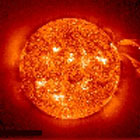|
|
Letter to The Australian
Tim Curtin
(published 24 March 2008; The Australian's deletions
are in red)
The Garnaut Review's Discussion paper on the Emission Trading
System (ETS) to be set up by 2010 is an amazing document, bereft
as it is of all common sense, let alone economics, but is full
of some very astute politics. For example, the caps needed to
achieve the Rudd Government's target for an overall reduction
in greenhouse gases (GHG) to 40% of the 2000 level by 2050 could
be either straight-line for 40 years to 2050, with annual reductions
of 1.5% p.a. from 2010, or on a rising scale, with as little
as 0.1% to start with, building up to say 2% by the
time Nelson gets in around 2030. One does not need to
be a politician to see which of these options the present lot
will prefer!
The only other substantive point in the Paper is the proposal
for a Carbon Bank that it proposes should be set up to manage
the ETS. The most reasonable expectation is that the Rudd Government
will adopt Garnaut's least cost-effective ETS, namely one directed
at end-users of GHG (that is, you and me), as only that will
maximize the number of customers of the Bank. For if the ETS
were limited to the producers of GHG, then the only buyers
in Garnaut's Auction of emission allowances would be the coal
miners and producers/importers of oil and gas. With 75% of all
electricity currently produced by coal from 118 mines, and 16%
from gas and oil, which like virtually 100% of transport fuel
is produced from just seven refineries, none of which will easily
earn credits by reducing the CO2 content of their coal, oil,
and gas, who are the non-miners/refiners that will earn the credits
for sale to the miners and refiners should they wish to maintain/expand
production in excess of their caps? There is no scope for a new
Snowy to qualify, and nuclear is disallowed, so that with few
players in the ETS, the level of the implicit carbon tax emerging
from any trading is likely to be too low to attract many new
entrants to the renewable energy scene.
Thus, if GHG are attacked at source, with just miners, refiners
and the odd windmiller as players, there will be few trades,
and the Garnaut Bank's emporium in Treasury Place will be strangely silent. How
much more endearing if instead we end-users are all required
to buy allowances in the Auction, and then vie with each other
in bidding for extra whenever we buy that second car or investment
property or air tickets. Think of all the jobs for commissars
to monitor our usage with regular door-knocks, while the Bank
would need a branch in every High Street across the land.
If Rudd and Wong are more sensible than
Garnaut, they will settle for a greenhouse gas tax
that is effectively just an add-on to the GST. This
would require little more administrative effort than is currently
entailed by the GST - but would obviate any need for the Carbon
Bank and its bountiful employment of friends and relations of
the ALP including Ross Garnaut and his Review Team.
Tim Curtin was formerly adviser in the Treasury,
Papua New Guinea, 1988-1999
|
 |
Lavoisier the Man
Bio and Image |
 |
 |
Click above for latest SOHO sunspot images.
Click here for David Archibald on solar cycles. |
 |
 |
Where is that pesky greenhouse signature?
Click here for David Evans's article. |
|




